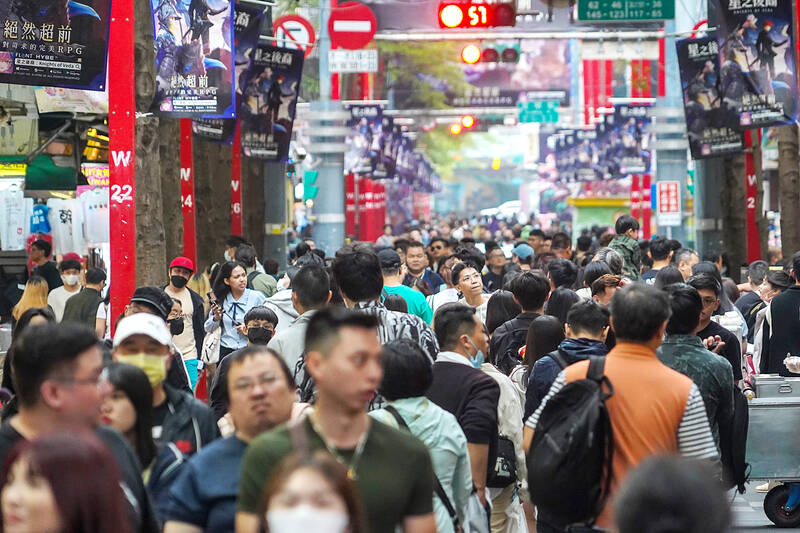Taiwanese workers under the age of 30 last year, on average, earned an annual income of NT$545,931 (US$17,044), a new high, as the economy continued to improve, data released by the Directorate-General of Budget, Accounting and Statistics (DGBAS) showed.
That equated to monthly earnings of NT$45,494 per person, and marked an increase from NT$535,667 in 2022, the data showed.
In addition to an improved economy, average incomes rose as the unemployment rate declined and the minimum wage rose, the statistics agency said.

Photo: CNA
Overall, average income in Taiwan also hit a new record of NT$709,000 last year, up from NT$704,000 in 2022, the data showed.
Average income across all age groups rose last year, the agency said.
Average income includes wages, investment returns, rental income and government subsidies, it said.
One-off government cash payments of NT$6,000 each to Taiwanese and certain foreigners also helped boost average income last year, the DGBAS added.
Last year, the average deficit in savings for the lowest 20 percent of households reached a 15-year low of NT$16,626, which occurs when household spending exceeds disposable income, it said.
That was the lowest figure since 2008 when negative savings were at NT$5,901, and was the 17th consecutive year the group recorded negative savings, it said.
The DGBAS said that its savings data did not include households’ aggregate savings, stock or real-estate holdings, so negative savings do not necessarily mean a household is poor.
More than 60 percent of households in the lowest 20 percent income bracket are composed of people aged 65 or older, and many of them rely on savings to cover their financial needs, it said.
Therefore, it is not surprising that that income group tends to report negative savings, it added.
Average household savings totaled NT$275,402 last year, a new high and up NT$1,370 from a year earlier, the DGBAS said.
The average household’s disposable income last year rose 2.5 percent from 2022 to NT$1.14 million, while the median figure was NT$961,000, up 2.2 percent from a year earlier, data showed.
Average disposable income for individuals last year increased 4 percent from a year earlier to NT$407,000, while median disposable income rose 3.7 percent to NT$349,000, the data showed.

AT RISK: The council reiterated that people should seriously consider the necessity of visiting China, after Beijing passed 22 guidelines to punish ‘die-hard’ separatists The Mainland Affairs Council (MAC) has since Jan. 1 last year received 65 petitions regarding Taiwanese who were interrogated or detained in China, MAC Minister Chiu Chui-cheng (邱垂正) said yesterday. Fifty-two either went missing or had their personal freedoms restricted, with some put in criminal detention, while 13 were interrogated and temporarily detained, he said in a radio interview. On June 21 last year, China announced 22 guidelines to punish “die-hard Taiwanese independence separatists,” allowing Chinese courts to try people in absentia. The guidelines are uncivilized and inhumane, allowing Beijing to seize assets and issue the death penalty, with no regard for potential

STILL COMMITTED: The US opposes any forced change to the ‘status quo’ in the Strait, but also does not seek conflict, US Secretary of State Marco Rubio said US President Donald Trump’s administration released US$5.3 billion in previously frozen foreign aid, including US$870 million in security exemptions for programs in Taiwan, a list of exemptions reviewed by Reuters showed. Trump ordered a 90-day pause on foreign aid shortly after taking office on Jan. 20, halting funding for everything from programs that fight starvation and deadly diseases to providing shelters for millions of displaced people across the globe. US Secretary of State Marco Rubio, who has said that all foreign assistance must align with Trump’s “America First” priorities, issued waivers late last month on military aid to Israel and Egypt, the

‘UNITED FRONT’ FRONTS: Barring contact with Huaqiao and Jinan universities is needed to stop China targeting Taiwanese students, the education minister said Taiwan has blacklisted two Chinese universities from conducting academic exchange programs in the nation after reports that the institutes are arms of Beijing’s United Front Work Department, Minister of Education Cheng Ying-yao (鄭英耀) said in an exclusive interview with the Chinese-language Liberty Times (the Taipei Times’ sister paper) published yesterday. China’s Huaqiao University in Xiamen and Quanzhou, as well as Jinan University in Guangzhou, which have 600 and 1,500 Taiwanese on their rolls respectively, are under direct control of the Chinese government’s political warfare branch, Cheng said, citing reports by national security officials. A comprehensive ban on Taiwanese institutions collaborating or

France’s nuclear-powered aircraft carrier and accompanying warships were in the Philippines yesterday after holding combat drills with Philippine forces in the disputed South China Sea in a show of firepower that would likely antagonize China. The Charles de Gaulle on Friday docked at Subic Bay, a former US naval base northwest of Manila, for a break after more than two months of deployment in the Indo-Pacific region. The French carrier engaged with security allies for contingency readiness and to promote regional security, including with Philippine forces, navy ships and fighter jets. They held anti-submarine warfare drills and aerial combat training on Friday in